

Futurism. Scenarios 2020. E-Mergences swicki - powered by eurekster. Future Problem Solving Program International. Future Problem Solving Program International (FPSPI), formerly known as the Future Problem Solving Program (FPSP), aims to "engage students in creative problem solving".
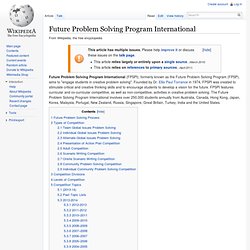
Founded by Dr. Ellis Paul Torrance in 1974, FPSPI was created to stimulate critical and creative thinking skills and to encourage students to develop a vision for the future. FPSPI features curricular and co-curricular competitive, as well as non-competitive, activities in creative problem solving. The Future Problem Solving Program International involves over 250,000 students annually from Australia, Canada, Hong Kong, Japan, Korea, Malaysia, Portugal, New Zealand, Russia, Singapore, Great Britain, Turkey, India and the United States. Future Problem Solving Process[edit] The Future Problem Solving (FPS) Process is used in all competitions except the Scenario Writing competitions. Types of Competition[edit] Team Global Issues Problem Solving[edit] Extinction_timeline.pdf (Objet application/pdf)
FPSPI.
All Headlines - Future of News. Future of News Portal Our traditional news media are in trouble.

David Brin on the role of the internet in the future. Accelerating Technology & Future Tech - Global Brain & Synaptic Web - Community. TRENDsFACTORY 2015 : 200 pistes prospectives à surveiller. Shirky Vs Morozov. Program or Be Programmed: 10 Commands for a Digital Age. Thanks to digital technologies and networked activity, we’re living through a global transition that is redefining how culture and commerce operate.
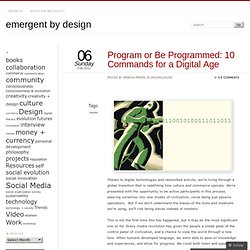
We’re presented with the opportunity to be active participants in this process, steering ourselves into new modes of civilization, verse being just passive spectators. But if we don’t understand the biases of the tools and mediums we’re using, we’ll risk being slaves instead of masters. This is not the first time this has happened, but it may be the most significant one so far. How Will We Collaborate if We Can’t Trust Each Other. A few years ago, I had a big snowcrash moment about the power of networks and the web, envisioning the amazing potential that could be unleashed if we could just build our networks and weave them all together.
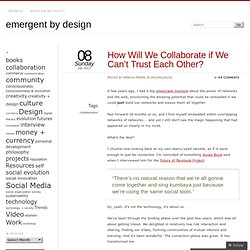
Fast forward 18 months or so, and I find myself embedded within overlapping networks of networks…. and yet I still don’t see the magic happening that had appeared so clearly in my mind.
Information du futur: trouver la réalité dans le code. Quel avenir pour l'information ?
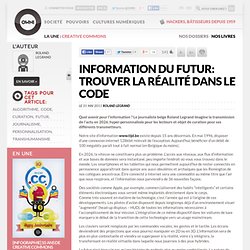
Le journaliste belge Roland Legrand imagine la transmission de l'actu en 2026, hyper-personnalisée pour les lecteurs et objet de curation pour ses différents transmetteurs. Notre site d’information www.tijd.be existe depuis 15 ans désormais. En mai 1996, disposer d’une connexion internet 128kbit relevait de l’exception.
7 Values of a Next-Gen Agency. Joël de Rosnay - The World Knowledge Dialogue.
A Movement to Unite All Good Will Movements. [Update] This article was published over in July of 2009 and it speaks directly to the revolutionary spirit that began sweeping the world near the end of 2010.
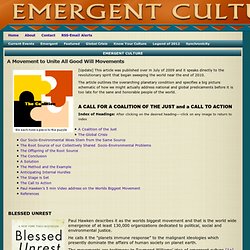
The article outlines the overarching planetary condition and specifies a big picture schematic of how we might actually address national and global predicaments before it is too late for the sane and honorable people of the world. A CALL FOR A COALITION OF THE JUST and a CALL TO ACTION Index of Headings: After clicking on the desired heading—-click on any image to return to index. A_decade_later.gif (800x12864) Fight for the Future, defending our basic rights and freedoms. World Wide Web Foundation. Ross Dawson on opportunities for business and society in a hyper-connected world.
The World Question Center 2010. I received this year's Edge Question while in Damascus, shuttling messages from Jerusalem aimed at probing possibilities for peace.
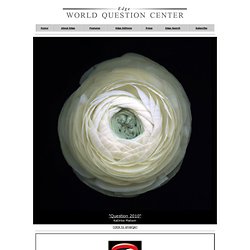
And I got to thinking about how my thinking on world peace and transnational violence has been shaped by the Internet, and how the advent of the Internet has framed my view of human history and destiny. I'm aware that I'm living on the cusp of perhaps the third great tipping point in human history, and that this is an awesome and lucky thing to experience. First, I imagine myself with a small band moving out of Africa into the Fertile Crescent around 60,000 years ago or so, when humans mastered language and began to conquer the globe.
More than half a million years ago, the Neanderthal and human branches of evolution began to split from our common ancestor Homo erectus (or perhaps Homo ergaster). HalfPastHuman. Contact Summit 2011: The Evolution Will Be Social. Michel Serres - Les nouvelles technologies : révolution culturelle et cognitive. Vidéo sous-titrée : conférence Michel Serres, lancement du Programme Paris Nouveaux Mondes. What the Contact Conference Was Really About. Photo: grant potter I am very grateful to have been able to take part in organizing the Contact Conference, an event that pitched itself as a working festival of innovation, a social technologies exhibitor space, and a celebration of the potential of a network culture.
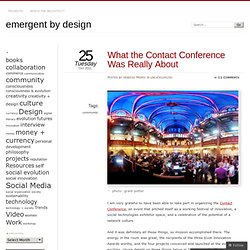
And it was definitely all those things, so mission accomplished there. The energy in the room was great, the recipients of the three $1oK Innovation Awards worthy, and the four projects conceived and launched at the event exciting. (more details on those things below in Douglas Rushkoff’s letter to participants) But that’s really only a part of the story. Four Arguments for the Elimination of Television. Four Arguments for the Elimination of Television (1978) is a book by Jerry Mander, who argues that many of the problems with television are inherent in the medium and technology itself, and thus cannot be reformed. Mander spent 15 years in the advertising business, including five as president and partner of Freeman, Mander & Gossage, San Francisco, a nationally-known advertising agency.[1] Summary[edit] Le blog de Jean-Michel Cornu.
Zeitgeist 2010. Une brève histoire de l'avenir de Jacques Attali. Dans son dernier livre, Une brève histoire de l’avenir, à la fois fascinant et dérangeant, Jacques Attali déroule l’histoire des soixante prochaines années du monde.
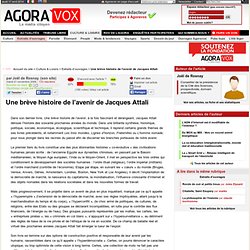
Dans une brillante synthèse, historique, politique, sociale, économique, écologique, scientifique et technique, il reprend certains grands thèmes de ses livres précédents, et notamment Les trois mondes, Lignes d’horizon, Fraternités ou L’homme nomade, pour nous plonger dans les racines du passé afin de discerner les branches porteuses de notre avenir.
Le premier tiers du livre constitue une des plus étonnantes histoires « co-évolutive » des civilisations humaines jamais écrite : de l’ancienne Egypte aux dynasties chinoises, en passant par le Bassin méditerranéen, le Moyen Age européen, l’Inde ou le Moyen-Orient, il met en perspective les trois ordres qui conditionnent le développement des sociétés humaines : l’ordre rituel (religieux), l’ordre impérial (militaire) et l’ordre marchand (contrôle de l’économie). "Questions Numériques 2011-2012" : Cahier d’enjeux. Le 26 octobre 2010, la Fing réunissait 120 décideurs, chercheurs et innovateurs pour identifier et formuler ensemble les "Questions numériques" qui les concerneront en 2011, et au-delà.
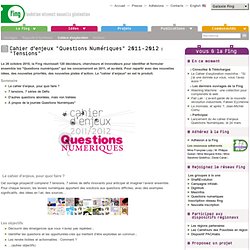
Pour repartir avec des nouvelles idées, des nouvelles priorités, des nouvelles pistes d’action. Le "cahier d’enjeux" en est le produit.
Home - Don Tapscott. L'évolution du Web. Imagining the Internet. SAMPLE: Here's a selection of quote excerpts from the thousands of predictions in the 2012 report about expectations for the teens-to-20s age group - Generation AO - and the human impact of people's uses of the Internet by 2020: “There is no doubt that brains are being rewired.” Why Gigaom thinks it’s time to reinvent the internet. It’s hard to think of something that has changed the world more in the last 25 years than the transformation of the internet into the most widespread form of communication and expression the world has ever seen.
Unfortunately, if it is to remain as open and inexpensive a means of communication as we’ve known it, some things will have to change. One of the founding principles of Gigaom is that connectivity is the lifeblood of the tech industry, and over the years we’ve tried to shape our coverage as much around that topic as possible. 21st Century Fluency Project. The “Unhyped” New Areas in Internet and Mobile.
Editor’s note: Legendary investor Vinod Khosla is the founder of Khosla Ventures. You can follow him on Twitter at @vkhosla.